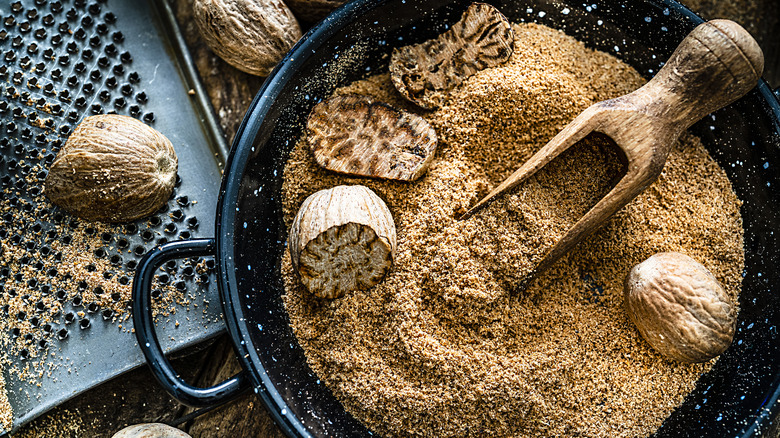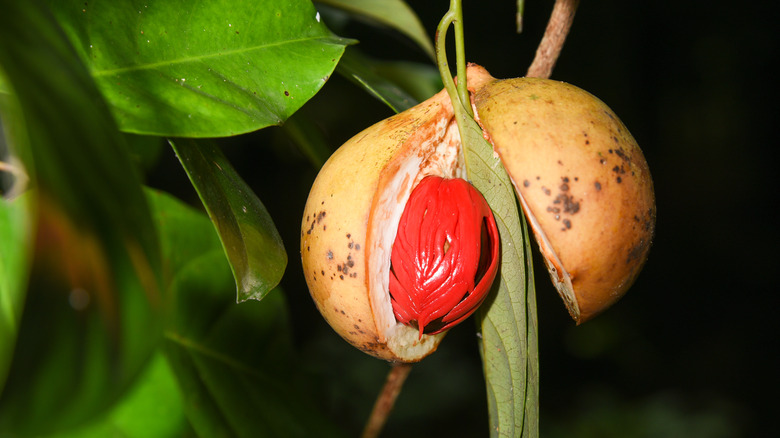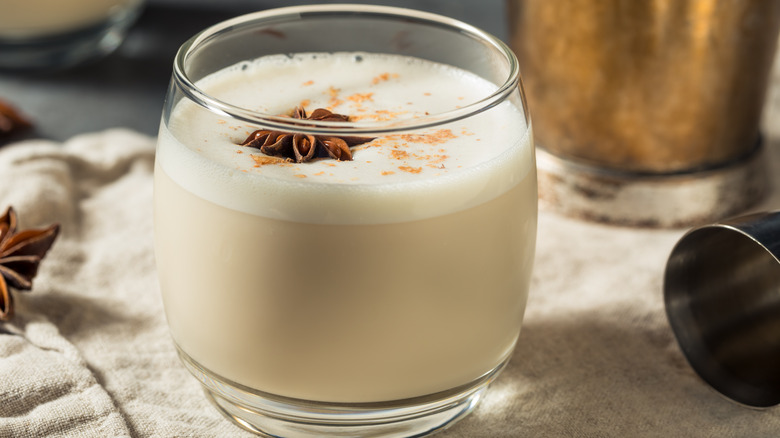Why Home Cooks Shouldn't Worry About Nutmeg's Hallucinatory Effects
With a wealth of food-related information at our fingertips, you'd think hallucinatory spices would be big news. Not so, apparently, based on the countless number of home cooks unaware of nutmeg's little secret. A "scare" of chemically infused nutmeg made the rounds in the 2010's, but it's been a while since the phenomenon has landed on the radar of average consumers. The concern was not without a measure of merit. Nutmeg's psychoactive properties were highlighted in Malcolm X's 1965 autobiography, where he described how the spice was commonly used as a substitute for illicit substances within the confines of prison. However, home cooks using nutmeg for regular culinary applications have several reasons not to be concerned.
First of all, the mind-altering effects of nutmeg come from a naturally occurring compound, not from anything nefariously added. The natural chemical creating a feeling of being "high" is called myristicin, and it's also inherent in the essential oils of other plants, including dill and parsley. When consumed by humans, it starts breaking down inside the body and can affect the sympathetic nervous system, similar to the well-known effects of the peyote plant.
However, it takes an awful lot of nutmeg, consumed in concentrated amounts, to get hallucinatory results, meaning you'd have to be really trying to get there. In normal use for cooking, that's unlikely to happen, since it would take ingesting at least 2 tablespoons of powdered nutmeg to reach the level of "nutmeg poisoning."
More reasons to put nutmeg fear aside
There's an additional reason why home cooks don't need to keep nutmeg locked away in a kitchen safe. If someone does exceed 2 tablespoons of nutmeg in one go, the negative side effects far outweigh any sense of perceived pleasure. Yes, you could experience hallucinations, but less-enticing outcomes can include nausea, dizziness, delirium, hypertension, facial flushing, and extreme dry mouth. It's not exactly an experience many would seek on purpose, so don't worry unless there's concern over addictive behavior within your circle of friends or family.
A positive plus in the nutmeg column is its medicinal attributes, some of which have been acknowledged for centuries. Nutmeg is actually a seed kernel nestling within the golden-yellow fruit of the tropical nutmeg tree, encased by a striking red coat of mace. It's native to the Molucca "Spice Islands" of Indonesia. The seeds harbor high amounts of antioxidants and can be ingested as a digestive aid and to treat nausea, reduce blood pressure, improve overall mood, and aid in dental health and obtaining more restful sleep, notes WebMD.
Because nutmeg isn't a nut but a seed, it's not considered a risk to individuals with nut allergies. That's all the more reason to keep it in your repertoire of cooking spices — just be aware not to overuse it in excessive quantities. Lest you need any more convincing, consider its influence on the ever-beloved milk punch drink made famous by a certain Founding Father in the 1700s.
Cooking with nutmeg
Cooking with nutmeg is familiar to many chefs, especially during holiday periods. It's often part of eggnog recipes, spiced bundt cakes, fruitcakes, and pumpkin pie spice mixes, which typically include ginger, cloves, cinnamon, and allspice. Nutmeg also defines many bechamel sauces and custards as well as curries and Mughlai-style dishes from India. It helps enhance the flavor of rice, pasta, fruit, sweet potatoes, squash, and most types of vegetables.
Nutmeg historically spices up hot spirits such as mulled ciders and wines, and even landed a place in history with a handwritten recipe by American inventor, scientist, and Founding Father Ben Franklin. In 1762, just 14 years before signing America's Declaration of Independence, he penned his personal milk punch recipe to a decades-long pen pal, James Bowdoin. In his now-famous flowing cursive style, Franklin immortalized his milk punch recipe, which calls for four full freshly grated nutmeg pods and a whole mess of brandy, which may have started the rumors of nutmeg's hallucinatory effects.
If you or anyone you know needs help with addiction issues, help is available. Visit the Substance Abuse and Mental Health Services Administration website or contact SAMHSA's National Helpline at 1-800-662-HELP (4357).



